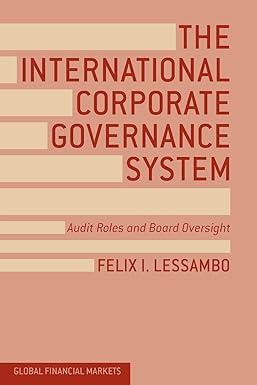Question
You are the Engagement Quality Control Reviewer in the firm Hartley & King (HK) LLP and you are responsible for the independent review of all
You are the Engagement Quality Control Reviewer in the firm Hartley & King (HK) LLP and you are responsible for the independent review of all audits. It is March 1st, 2019, you are reviewing the audit working papers and draft audited financial statements of Touchwood Tires (TT), a private company, for the year-end December 31, 2018, and the recommended auditors report (an unqualified opinion) dated February 28, 2019. TT has several stores and a main warehouse.
Your firm has audited TT for several years. The 2018 year-end audit was conducted in the two-month period from mid-December 2018 to mid-February 2019. The audit team consisted of the partner, an audit manager and two staff members, a senior auditor, who has been involved with the audit of TT for several years, and a newly hired junior auditor.
The following is some key information from TTs draft audited financial statements:
| Sales | $50,000,000 |
| Net income | 500,000 |
| Inventory | 10,000,000 |
| Total Assets | 60,000,000 |
| Total Liabilities | 40,000,000 |
After reviewing the audit file, you decide to write a memo to the engagement partner, with a copy to the managing partner of the firm, expressing your concerns and what needs to be done before you are prepared to sign off on the engagement Below are the relevant excerpts from the audit files used to draft your memo:
Excerpts from Audit Working Papers
Accounts Receivable
Accounts receivable confirmations were sent to 30 largest customers, which represented 75% of the accounts receivable balance. The following discrepancies were noted in the audit file:
- Trans Auto Inc. indicated that they are disputing the $40,000 owing to TT as the tires they received were defective. The audit senior agreed the amounts owing to the invoices, shipping documents, and customer orders and found no discrepancies. The audit senior concluded that no adjustment was required.
- Automotive Parts Inc. indicated that they are in a state of financial difficulty and they would like to re-negotiate the terms for the payment of their $35,000 balance. Based upon this reply, the audit senior concluded that this amount was likely uncollectable and should be provided for in the allowance for doubtful accounts. The proposed adjustment of $35,000 was included in the summary of possible misstatements.
Inventory
The inventory count was performed at the main warehouse in Ontario, where 60% of the inventory is held. Inventory during the count was well organized and all items in the warehouse were appropriately tagged. Inventory counters were working in pairs to ensure the accuracy of the count.
Inventory Test Counts
We selected a random sample of 40 different products from the inventory listing and performed a test count on each of those items. All of the test counts agreed to the count sheets except for the following two discrepancies:
| Product | Description | # of items per auditor | # of Items per count |
| Model # 5267XYB | Winter Tires | 44 | 45 |
| Model # 645XMHN | All Season Tires | 33 | 36 |
Upon discussion with the warehouse manager these discrepancies are a result of one particular counter who had been assigned to count the tire inventory and was continuously making errors. Tires are organized by model and are stored in five-tiered shelving racks that hold 9 tires per row. The warehouse manager has since replaced this particular counter. No further audit work is required.
Selected a sample of 40 items from the inventory floor and performed a test count on each of these items. All items tested agreed to the count conducted by the counter.
Pricing and Compilation Testing
Price tests were performed on the items selected during the count. Each item was agreed to the supplier invoice and no discrepancies were noted. As tires do not have an expiration date, obsolescence is not an issue; therefore, net realizable value testing was not necessary. Based upon the work perform, we conclude inventory is fairly stated.
REQUIRED
a) (9 marks) Accounts Receivable. In the table below identify and explain three major deficiencies in the work performed in the accounts receivable testing. Provide recommendations regarding further actions and/or audit procedures.
b) (9 marks) Inventory - In the table below identify and explain three major deficiencies in the work performed in the testing of inventory. Provide recommendations regarding further actions and/or audit procedures.
Step by Step Solution
There are 3 Steps involved in it
Step: 1

Get Instant Access to Expert-Tailored Solutions
See step-by-step solutions with expert insights and AI powered tools for academic success
Step: 2

Step: 3

Ace Your Homework with AI
Get the answers you need in no time with our AI-driven, step-by-step assistance
Get Started


